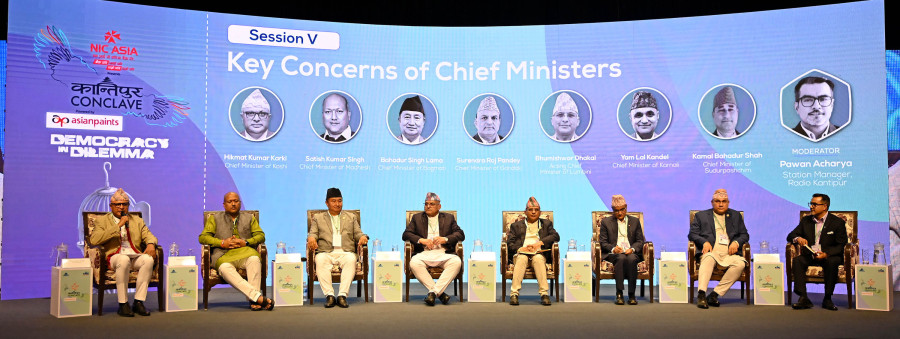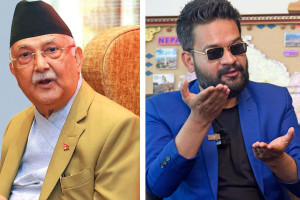Columns
CMs’ concerns at Kantipur Conclave
Their insights at the conclave serve as a roadmap for strengthening federalism in Nepal.
Khim Lal Devkota
The formal implementation of federalism in Nepal began after the three-tier elections in 2017. As it completes its seventh year, the journey to effective implementation remains fraught with challenges. The recent Kantipur Conclave (November 13-14) brought together the chief ministers of all provinces to discuss the progress, hurdles and opportunities in federal governance in a session titled “Face to Face with Chief Ministers”. Their insights shed light on the practical realities of federalism, revealing gaps in legislation, administrative autonomy, fiscal federalism and intergovernmental relations.
Chief ministers highlighted several shared concerns about federalism's implementation. Hikmat Karki, Chief Minister of Koshi Province, said that provinces are given a “treasure bag without money,” referring to the lack of fiscal autonomy. He pointed out that while Koshi Province has made progress, such as reforming the vehicle licensing system, it still faces significant barriers due to the absence of enabling legislation and institutional support from the federal government.
Similarly, Satish Kumar Singh, Chief Minister of Madhesh Province, echoed the frustration over the gap between rights and resources. He compared Nepal’s federalism with India’s, highlighting how Indian states are empowered with resources and authority to implement their mandates. Singh called for more clarity in resource allocation and legislative framework and emphasised the need for regular evaluation and accountability for civil servants.
The struggle for autonomy and functionality is not confined to these provinces. Chief Minister Bahadur Singh Lama of Bagmati Province pointed to a lack of laws governing exclusive and shared powers as a fundamental issue, despite his province achieving over 70 percent budget utilisation. Surendra Raj Pandey of Gandaki Province articulated similar concerns. He metaphorically described how federalism is stuck in a “2G framework” while governance demands have moved into a “5G era”. Pandey emphasised that the delayed enactment of critical federal laws, such as the Federal Police Act and the Education Act, prevents provinces from functioning effectively. He criticised the centralised mindset of political leaders and bureaucrats, which stymies the progress of federalisation.
Acting Chief Minister Bhumeswar Dhakal of Lumbini Province stressed that provinces are the backbone of federalism and pivotal for connecting government to the people. He expressed frustration over the federal government’s failure to release grants on time and clarify shared powers. Meanwhile, Yam Lal Kandel of Karnali Province focused on the need for equitable resource allocation. He criticised the centralised governance model, arguing that it perpetuates disparities between provinces. Kandel called for timely legislation and structural alignment to enable provinces to fulfil their constitutional mandates and address development gaps.
Kamala Bahadur Shah, the Chief Minister of Sudurpaschim Province, shed light on bureaucratic resistance. He shared an anecdote where a government secretary denied provincial authority but exerted control when operating in Kathmandu. According to Shah, this duality highlights the reluctance among bureaucrats to embrace federalism. He urged leaders to adopt a federal mindset and foster collaboration to strengthen governance at all levels.
Despite challenges, chief ministers also shared some successes and opportunities. For example, the vehicle licensing reform in Koshi Province and Bagmati Province’s high budget utilisation demonstrate that provinces can deliver tangible results when given authority and resources. However, these isolated successes cannot mask the persisting systemic issues across provinces.
At the Kantipur Conclave, their concerns were similar to those raised during programmes organised in all provincial capitals by the Federalism and Localization Centre, facilitated by the chief ministers’ offices in September 2024.
Federalism is a shared responsibility, and its success depends on the collective efforts of federal, provincial and local governments. Chief ministers emphasised that the federal government must lead by example, demonstrating a commitment to federalisation and creating an enabling environment for provinces to thrive.
Prime Minister KP Sharma Oli also addressed the conclave, emphasising the government's commitment to enacting laws that will provide reasonable powers to the provinces in line with the constitution. In response to concerns raised by the chief ministers regarding the lack of essential resources, such as financial autonomy and police powers, Oli acknowledged that the federal government has yet to enact laws that would fully empower the provinces. However, he assured that such laws would be made to ensure that provinces receive the rights they are entitled to.
Prime Minister Oli's message, however, was not entirely encouraging for the provinces. He suggested that rather than focusing on “Sanduk ra Banduk” (fiscal resources and police authority), provinces should prioritise working with ideas and enthusiasm. Drawing on the example of Mahatma Gandhi, who achieved monumental change without weapons or fiscal resources, Oli emphasised that “thoughts” and “enthusiasm” are key to progress, suggesting that provinces should cultivate a mindset of innovation and dedication rather than waiting for more powers to be granted.
While his statement reflected optimism and a call for action, it highlighted a more cautious approach toward empowering the provinces, contrasting with the urgency the provincial leaders expressed.
The insights shared by the chief ministers at the conclave serve as a roadmap for strengthening federalism in Nepal. Their voices underscore the need for clear laws, robust institutions and a commitment to federalisation and inclusivity. Addressing legislative gaps, empowering provinces with resources and authority and fostering a decentralised mindset are critical steps toward realising the promise of federalism.
As Nepal navigates its federal journey, these lessons must guide its path toward more effective and equitable governance. By tackling the systemic issues collectively, Nepal can fulfil the promise of federalism and build a governance system that serves its diverse population. The conclave provided a platform for these critical discussions, and it is now up to the stakeholders to act on these insights and strengthen the federal framework. Federalism in Nepal remains a work in progress, but with concerted efforts, it holds the potential to transform governance and empower provinces to become engines of development and inclusivity.




 19.12°C Kathmandu
19.12°C Kathmandu















